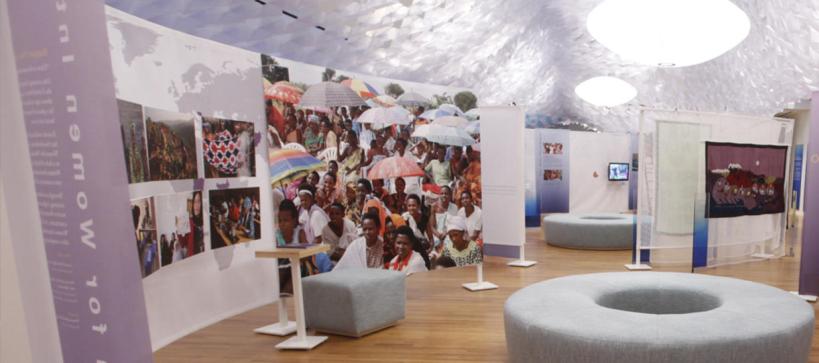
Installation photo by Steve Cohn.
Women Hold Up Half the Sky
October 27, 2011–May 20, 2012

Installation photo by Steve Cohn.
October 27, 2011–May 20, 2012
This exhibition was on view at the Skirball
October 27, 2011–May 20, 2012
The traveling exhibition Women Hold Up Half the Sky was inspired by the critically acclaimed book Half the Sky: Turning Oppression into Opportunity for Women Worldwide, by Nicholas D. Kristof and Sheryl WuDunn.
Featuring documentary photographs, visual art, sound installations, and interactive opportunities for visitors to get involved, Women Hold Up Half the Sky was a wake-up call to the injustices perpetrated against women worldwide and the ways we can effect change.
Confronting the malign persistence of sex trafficking, gender-based violence, and maternal mortality, the exhibition told stories of women from around the globe who changed their lives through education, economics, and self-determination. Among them was Saima Muhammad, who lived in fear of her abusive husband and whose community ignored her suffering until she received a $65 microloan and built an embroidery business that now supports thirty families in her Pakistani village. The exhibition also spotlighted visionaries like Edna Adan Ismail, the former first lady of Somalia, who used her life savings to build a maternity hospital in war-torn Somaliland, prompting donations and support from all over the world.
Freedom Center
Cincinnati, Ohio
October 26, 2012–March 30, 2013
Illinois Holocaust Museum & Education Center
Skokie, IL
September 25, 2016–January 22, 2017
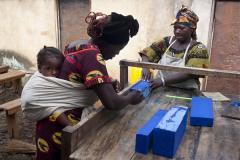
Women enrolled in Women for Women International's programs in Rwanda and the Democratic Republic of the Congo.
Photograph by Les Stone.
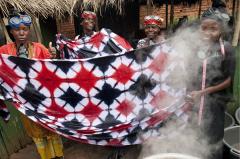
Women enrolled in Women for Women International's programs in Rwanda and the Democratic Republic of the Congo.
Photograph by Les Stone.
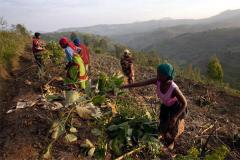
Women enrolled in Women for Women International's programs in Rwanda and the Democratic Republic of the Congo.
Photograph by Les Stone.
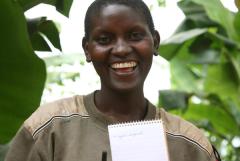
A $2 loan enabled Goretti Nyabenda to purchase fertilizer and begin a business making banana beer. She now supports her family of six, and her husband no longer abuses her.
Photograph by Nicholas D. Kristof.
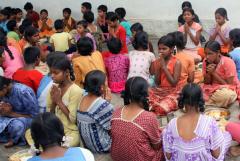
Girls and boys offer a prayer before eating. They are students at Prajwala, an education center in Hyderabad, India, dedicated to preventing sex trafficking and to rehabilitating survivors.
Photograph by Nicholas D. Kristof.
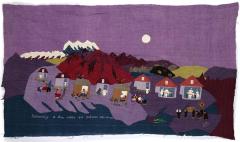
Dedicated to Delfina, 29, by The Safe Birth and Motherhood Committee of Bolivia, from the White Ribbon Alliance for Safe Motherhood’s Stories of Mothers Lost.
During her third pregnancy, Delfina was given medication for high blood pressure, but her access to doctors was limited. About six months into her pregnancy, Delfina was overcome by a terrible headache. Her family brought her to the hospital, but it was too late. She was diagnosed with eclampsia and fell into a coma. Her baby daughter died three days later.
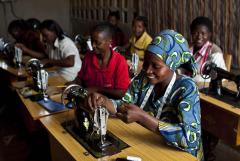
Women enrolled in Women for Women International's programs in Rwanda and the Democratic Republic of the Congo.
Photograph by Les Stone.
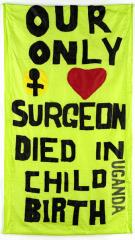
Dedicated to Dr. Cecilia Achadu Otim by The Naguru Teenage Information & Health Centre of Straight Talk Uganda, from the White Ribbon Alliance for Safe Motherhood’s Stories of Mothers Lost.
Cecilia was the only female heart surgeon in Uganda. After a healthy pregnancy, her baby girl was born by caesarean section. An hour after the operation, Cecilia’s breathing suddenly changed. No nurse was available. Only her mother was present with Cecilia as she took her last breath.
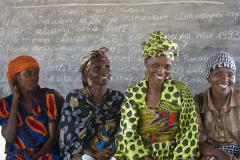
Women enrolled in Women for Women International's programs in Rwanda and the Democratic Republic of the Congo.
Photograph by Les Stone.
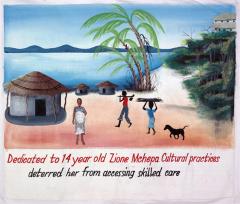
Dedicated to Zione Mchepa, 14, by The White Ribbon Alliance for Safe Motherhood – Malawi, from the White Ribbon Alliance for Safe Motherhood’s Stories of Mothers Lost.
In the midst of her delivery, Zione’s family realized that her baby was too big to be delivered without medical help. While debating whether to send her to the hospital, Zione died.
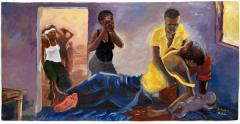
Dedicated to Sisters Bolumbu, Madeleine, and Nzako by the Maternité Sans Risque, Democratic Republic of the Congo, from the White Ribbon Alliance for Safe Motherhood’s Stories of Mothers Lost.
Bolumbu Bangolo had three healthy children. During labor for her fourth pregnancy, Bolumbu experienced complications, but there were no doctors, equipment, or medications available to treat her. She died with her family and nurses around her. Bolumbo’s sisters also died of complications related to childbirth.
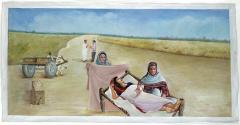
Dedicated to Nazeer Bibi by the Yar Muhammad Samejo Educational Society and Development Organization of Pakistan, from the White Ribbon Alliance for Safe Motherhood’s Stories of Mothers Lost.
Throughout her pregnancy, Nazeer worked in the fields with her husband. When she went into labor, she started to feel great pain. Her husband refused help from a male health worker. Nazeer died under the open sky.
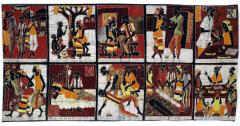
Dedicated to Fatou, 26, by the White Ribbon Alliance for Safe Motherhood – Burkina Faso, from the White Ribbon Alliance for Safe Motherhood’s Stories of Mothers Lost.
Fatou and her husband, Amadou, were overjoyed at the prospect of being parents. During Fatou’s labor at the local health center, she lost a lot of blood and became very weak. The health center was not equipped to perform a cesarean section in time; as a result the baby did not survive. The doctors tried to save Fatou’s life, but they did not succeed. Her husband remains inconsolable.
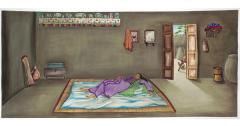
Dedicated to Hajra Hakeem, 27, by the Yar Muhammad Samejo Educational Society and Development Organization of Pakistan, from the White Ribbon Alliance for Safe Motherhood’s Stories of Mothers Lost.
In Hajra's community in southwest Pakistan, there is a stigma attached to visiting clinics, even when husbands are present and health workers are female. Her husband did not allow her to seek treatment during her pregnancy. When she went into labor, she was left alone in a room to give birth without help. She delivered a baby boy and died shortly thereafter. The baby did not survive.
THE EXHIBITION AND RELATED PROGRAMS AT THE SKIRBALL CULTURAL CENTER WERE MADE POSSIBLE THROUGH THE GENEROUS SUPPORT OF:
The William C. Bannerman Foundation
Jo Bernard
The Boeing Company
Carsey Family Foundation
Commonwealth Cares Fund, Inc.
Rebekah and Howard Farber
Phyllis K. Friedman
Conrad N. Hilton Foundation
Jewish World Watch
joinFITE
Miriam Muscarolas and Grant Abramson
Nike Foundation
Eileen Harris Norton Foundation
Eugene and Ruth Roberts
Fredric M. Roberts
Roth Family Foundation
Ariane and Alienor Sauvage
Southern California Gas Company
Women’s Foundation of California